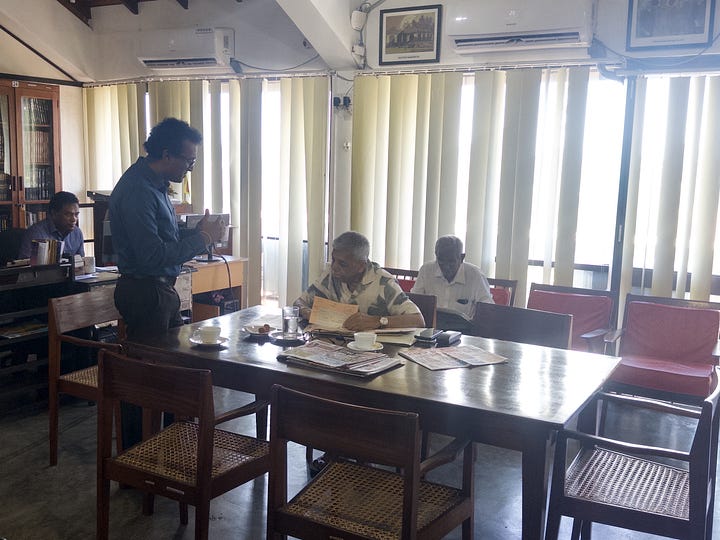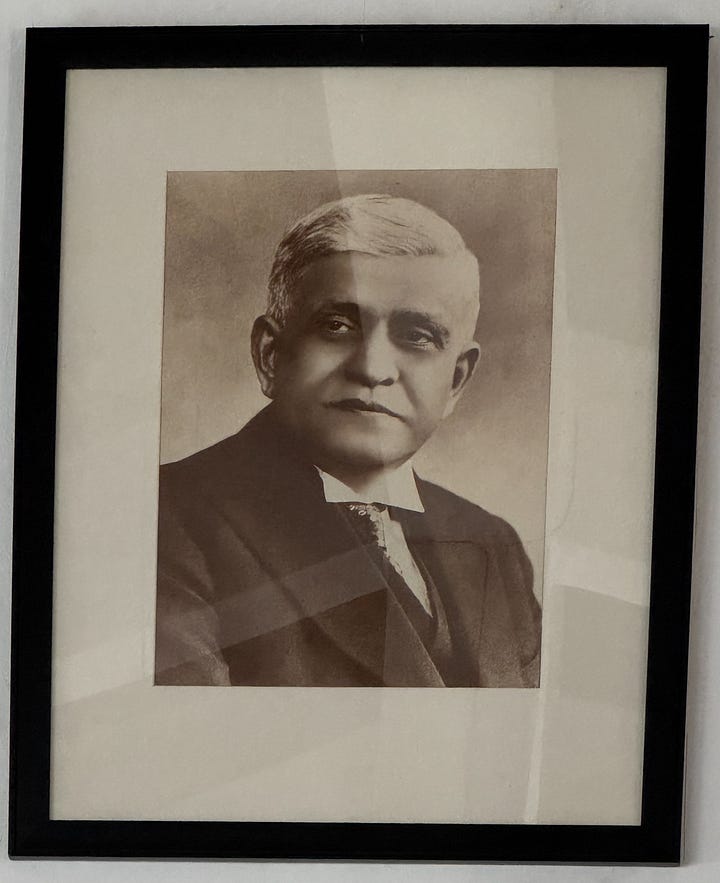The hidden library in the heart of Borella
The Sir DB Jayatilaka Memorial library on the top floor of the Borella YMBA building is kept in pristine condition, but visited by less than 5 people on most days.
Many people are surprised to find out that there is a library on the top floor of the Borella YMBA building.
The shopping complex is located near the busy Borella junction, and the small library sign near the entrance goes unnoticed by almost everyone walking past.
The exact date that the library was founded is not known, but is said to have started out as a small reading room in the YMBA headquarters. Over the years, it accumulated collections donated by several benefactors, including Sir DB Jayatilaka’s entire collection, which he gifted through his will after his death in 1944.
The library features books primarily on Buddhism, including The Buddhist journal, History, Archaeology, Philosophy, Biographies, and Martin Wickramasinghe’s entire collection. There is also a large cupboard hosting DB Jayatilaka’s private collection of ola leaf manuscripts of Buddhist commentaries.
The library was named the Sir DB Jayatilaka Memorial library in 1968; the former statesman’s 100th birth anniversary, and inaugurated by Ven. Dr. Walpola Rahula.
DB Jayatilaka served as the first president of the YMBA for over 4 decades, up until his death. He was a passionate advocate for Buddhist education, serving as principal of Dharmaraja College at the age of 22 and later on at Ananda College.
He was a well-read scholar who served as the editor-in-chief of The Buddhist, revised editions of Sinhalese literature such as the Dhampiya Atuva Getapadaya, Saddharma Ratnavaliya, and Sikavalana Vinisa, and editor of the Sinhalese Etymological Dictionary.
Leaving the world behind
The shopping and office complex, located near the busy Borella junction, hosts an array of shops catering to communications, sports, clothing, computer repair, electronics, and travel.
A large number of foot and vehicular traffic pass by the baseline road in front of the YMBA building. Buses stop just right outside, carting off passengers to and from each corner of Colombo. During peak hours, passengers are crammed up to the footboard while the shouting of conductors and rapid fires of bus honks punctuate the background.
But the sounds of the city are very much blunted towards the 3rd floor of the building, which houses the YMBA office and library. The glass doors and windows in the library keep the cool air of the recently installed air conditioner in, and much of the sounds from the street out.
The space is well-furnished with solid wooden tables and chairs. Ancient books with solid bindings are arranged neatly onto three rows of shelves, with a line running along the walls. On a large rectangular desk is a stack of the day’s English and Sinhala newspapers.
The librarian Lasantha Kumara, who has worked in the library for the past 15 years, sees that the library is kept in immaculate condition and everything is in its proper place.
High up on the wall hangs a black-and-white photo of DB Jayatilaka in a suit. There are intriguing paintings of the human condition by the artist Danny Wimalasiri, whose works are almost exclusive to this library.
There is a solitary computer for internet access, but the rest of the system is very much old school— the books that have been checked out are tracked by cards held in a small wooden tray.
But the most striking fact is how very few people used the library. On the days that the Daily News visited, there were never more than a single patron in the space at all times— other than YMBA staff. Going by the sign-in book at the entrance of the library, there had been less than 5 visitors to the library on most days.
Kumara says that there used to be more patrons before the pandemic; mostly elderly gentlemen, retired government officials, lawyers, and doctors. He thinks that some patrons must have passed away and acknowledges that the library was never that popular among young people.




Changes ahead
One of the regulars is Mr. Sunil Sirisena; retired Minister of Education secretary and a current Vice President of the YMBA. Sirisena comes by in the mornings to attend to official business.
He primarily oversees the YMBA’s school development projects, which provide Maths, English, and Science teachers to a number of underfunded schools throughout the island and university scholarships to their high-achieving students.
When asked about the low numbers, he says that “most of the books are classical books, archeological books, and Dhamma books. The clientele to read these things is limited.”
Sirisena has been advocating for the library to take a new direction. Recently they have started introducing novels, short stories, and poems to try to attract a wider audience. Sirisena plans to request the committee to allow for Rs. 150,000 a year for the purchase of new books, especially for children and young adults.
Sirisena hopes to recruit some of the children who come for the YMBA’s various other events, such as the Drama, Art, and Light of Asia competitions.
There are also plans to expand into the adjacent room that’s currently being used by the YMBA for conferences.
Behind a glass windowed cupboard are the books that DB Jayatilake once owned. Intriguing titles of spirituality and governance from our colonial past. Kumara unlocked the cupboard and showed me some books, yellowed with age.
“I would like to invite anyone who’s interested in books to come and use this space,” he said.
The library is open from Monday to Saturday, 8:30 a.m. to 4:00 p.m. Membership costs Rs. 500 annually, with an initial deposit of Rs. 1000.
(Originally published in the Daily News)





